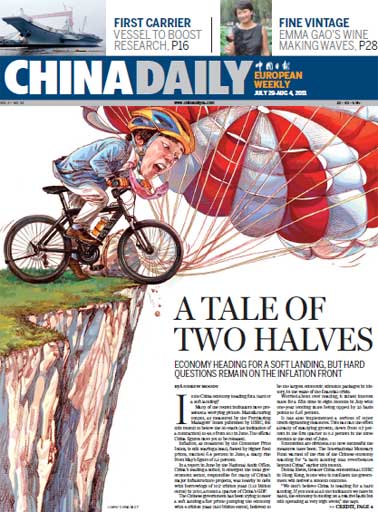Health
IN BRIEF
Updated: 2011-08-03 08:43
(China Daily)
Chew food longer for weight loss
A new study finds that people who chew their food more take in fewer calories, which may help them control their weight.
Chewing food 40 times instead of a typical 15 times caused study participants to eat nearly 12 percent fewer calories, according to results published in the American Journal of Clinical Nutrition.
Li Jie and colleagues from Harbin Medical University in China gave a typical breakfast to 14 obese young men and 16 young men of normal weight to see if there were differences in how they chewed their food. The researchers also looked to see whether chewing more would lead subjects to eat less and would affect levels of blood sugar or certain hormones that regulate appetite.
In the study, the team found a connection between the amount of chewing and levels of several hormones that "tell the brain when to begin to eat and when to stop eating," co-author Wang Shuran says.
More chewing was associated with lower blood levels of ghrelin, a hormone that stimulates appetite, as well as higher levels of CCK, a hormone believed to reduce appetite.
These hormones may "represent useful targets for future obesity therapies ," Wang says, since regulating their levels may help people control their appetite.
The 12 percent reduction in calories eaten by the group who chewed their food 40 times in the study could potentially translate into significant weight loss.
If the average person cut their calorie intake by 12 percent, they would lose nearly 11 kg in one year, says Adam Drewnowski, director of the University of Washington Center for Obesity Research in Seattle, who wasn't involved in the study.
Masturbation linked to more condom use
Masturbation could play an important role in sexual self-awareness and condom use in teenage boys, according to a new report.
Researchers found 86 percent of boys who said they had worn a condom last time they had sex also reported masturbating over the past year, compared to only 44 percent of boys who didn't masturbate.
While that link doesn't prove that masturbation itself leads to safer sex, "the association of any behavior with increased condom use deserves further investigation, given the rates of unintended pregnancies and sexually transmitted infections in adolescents," the report says.
The new study is based on a nationally representative survey of 820 adolescents between 14 and 17 in the United States.
Dr Cynthia Robbins at Indiana University in Indianapolis and colleagues found that nearly three-quarters of boys said they masturbated, while less than half of girls did so.
After taking age and partner status into account, sexually active boys who masturbated were about eight times as likely to have used a condom during their last intercourse as boys who didn't masturbate.
Writing in the Archives of Pediatrics & Adolescent Medicine, the researchers note that masturbation is a highly stigmatized topic, and that many doctors shy away from discussing the common phenomenon.
The findings of this study should be used by health care providers to inform, educate and reassure adolescents about masturbation to provide competent and comprehensive sexuality education in the clinical setting, they conclude.
Breast screening of little use, study finds
Falling breast cancer death rates have little to do with breast screening but are down to better treatment and health systems, scientists said on Friday, in a study likely to fuel a long-running row over the merits of mammograms.
Researchers analyzed data from three pairs of countries in Europe and found that although breast cancer screening programs had been introduced 10 to 15 years earlier in some areas than in others, declines in death rates were similar.
The findings suggest that "improvements in treatment and in the efficiency of healthcare systems may be more plausible explanations" for falling deaths rates from breast cancer, they wrote in a study in the British Medical Journal.
Breast screening is a hot topic among experts who disagree about whether nationwide mammogram programs do more harm than good. The fear among some is that over-diagnosis may mean many women are undergoing unnecessary radical treatment, suffering the physical and psychological impact of a breast cancer diagnosis that would otherwise not have come up.
Trends in breast cancer mortality rates varied little between countries where women had been screened by mammography for a considerable time compared with those where women were largely unscreened, according to the study.
Reuters - AFP
E-paper

Double vision
Prosperous Hangzhou banks on creative energies to bridge traditional and modern sectors
Minding matters
A touch of glass
No longer going by the book
Specials

Carrier set for maiden voyage
China is refitting an obsolete aircraft carrier bought from Ukraine for research and training purposes.

Pulling heart strings
The 5,000-year-old guqin holds a special place for both european and Chinese music lovers

Fit to a tea
Sixth-generation member of tea family brews up new ideas to modernize a time-honored business
